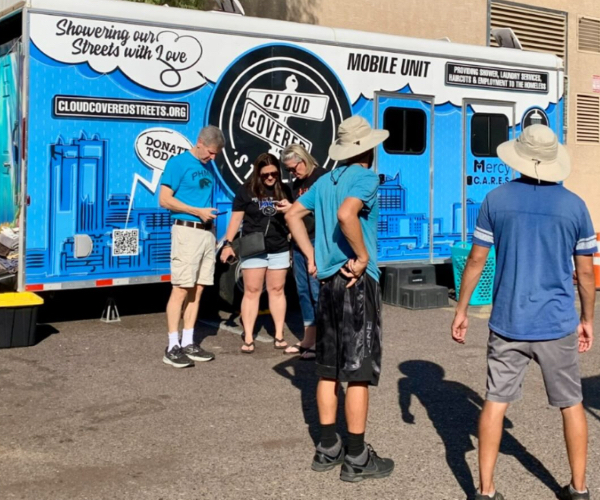BY ALISON BAILIN BATZ
As a non-profit health plan serving Arizona Health Care Cost Containment System members since 1985, Mercy Care has been a leader in advancing health equity in Arizona for nearly 40 years.
In an effort to improve the health and well-being of all Arizonans, Mercy Care is also the team behind Mercy C.A.R.E.S, short for “Community Action Resources Education and Service.” Through this community giving initiative, Mercy C.A.R.E.S. partners with organizations that advance health equity and furthers the vision that everyone, particularly those who are underserved with complex health needs, deserves to live a healthier life and achieve their full potential.
Each year, Mercy C.A.R.E.S. awards grants to projects that demonstrate positive impact to the community and align with one or more of Mercy Care’s community health focus areas which strive to manage chronic conditions, support mental health and well-being, address housing security, and empower recovery from substance abuse.

Over the past year, the impact made by the organization has been deeply felt across the state. For example, Valleywise Health Foundation received a $100,000 Mercy C.A.R.E.S. Community Reinvestment Grant to support the expansion of the Pediatric Care Coordination Medical Home Project, which expands the continuum of care to more than 11,700 patients ages 6 to 17, with a special emphasis on more than 5,100 vulnerable teen patients ages 13 to 17. “The grant targets teen patients who are experiencing deep poverty, family dysfunction, and homelessness. It also expands Valleywise Health’s capacity to reach teen patients through bi- directional texting, bi-lingual scheduling, and expanded provider availability for appointments,” said Dr. Jodi Carter, Chair of Pediatrics at Valleywise Health.
According to Dr. Carter, studies have shown that texting is the most effective and frequently used technology for low- intensity behavioral health interventions and has demonstrated effectiveness in supporting healthy behavior changes. Successful care coordination takes into consideration the continuum of health, education, early intervention, nutrition, mental and emotional health, and community partnerships, as well as financial resources for these services.
Mercy Care also recently awarded Arizona Friends of Foster Children Foundation (AFFCF) a Mercy C.A.R.E.S. Community Reinvestment Grant in the amount of $150,000. Funding will be used to support AFFCF’s rapid re-housing assistance for Arizona’s foster youth.
“This incredible, impactful gift will greatly uplift and empower AFFCF’s capacity to serve our state’s foster youth, ensuring children stay safe, sheltered, and supported,” said Luis De La Cruz, president and CEO of AFFCF. AFFCF’s Rapid Rehousing program is a branch of the nonprofit’s Keys to Success program, which serves foster youth from ages 16 to 26. This age group often experiences difficulty finding stable housing upon aging out of the state’s foster care system and are at risk of experiencing homelessness. For youth in foster care, they are unlikely to have developed a good system of credit or rental history to make acquiring steady housing easier. The Rapid Rehousing program is designed to reliably place youth in housing, thus allowing them to focus on education and career development in order to achieve self-reliance.
“Last year marked the inaugural year of AFFCF’s Rapid Rehousing program, and the nonprofit provided 126 youth with housing coaching and supportive services. To date, 100% of these children maintained their housing, and 73 young adults avoided becoming homeless through receiving emergency rental assistance and other supportive services provided by AFFCF,” said De La Cruz.
Beyond this, Covenant Health Network (CHN) also benefited from the grant program, earning a $186,700 grant to fund “Caring for our Care Force,” which offers evidence-based emotional wellness workshops to staff at nursing homes and assisted living centers. The workshops provide strategies for coping with stress related to caring for others and adapting to change.
“Working in senior care has always been a stressful, although meaningful, job. Those employees who are still working in the industry after the pandemic haven’t really had time or space to recover from the heightened fear, stress, and loss that occurred,” said Dr. Tana Luger Motyka, CHN’s vice president of research and analytics.
West Valley Health Equity is using its Mercy C.A.R.E.S. Community Reinvestment Grant in the amount of $146,650 to support Health Meets Home, a program through West Valley Health Equity that provides housing designed to create a supportive, sober, and healing home environment for its participants.

“At West Valley Health Equity, we recognize the profound impact of stable housing on overall well- being, and our commitment to health-supported housing is at the core of our mission. We understand that housing instability is intricately linked with access to healthcare and substance use disorders, all of which significantly affect maternal and child health,” said Julia Carlberg, MA, West Valley Health Equity executive board president. “Through Health Meets Home, we provide homes strategically located in walkable, mixed-use neighborhoods with proximity to public transportation, parks, and healthy food options, with the aim of bridging the service gap in addressing these intertwined crises in the Valley.”
As part of the program, CDC Public Health AmeriCorps members play a crucial role in delivering evidence- based Seeking Safety interventions, fostering recovery, and providing maternal and child resilience skill- building activities. They also ensure access to care through transportation services, recognizing the importance of breaking down barriers that may hinder individuals from receiving the healthcare they need.
“The health-supported housing program is showing that it improves maternal health outcomes, including reduced rates of maternal overdose, relapse, and postpartum depression,” said Trisha Stuart, Mercy Care director of community relations. “Additionally, the program aims to reduce preventable preterm births and NICU admissions, contributing to improved infant health outcomes.”
Other organizations that are benefitting from recent funding include Casa de los Niños, Central Arizona Shelter Services, Child Crisis Arizona, Cloud Covered Streets, March of Dimes, Southwest Human Development, and more.






